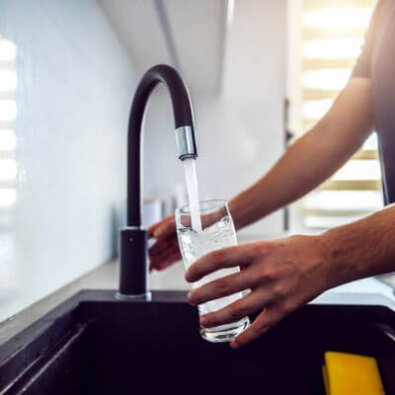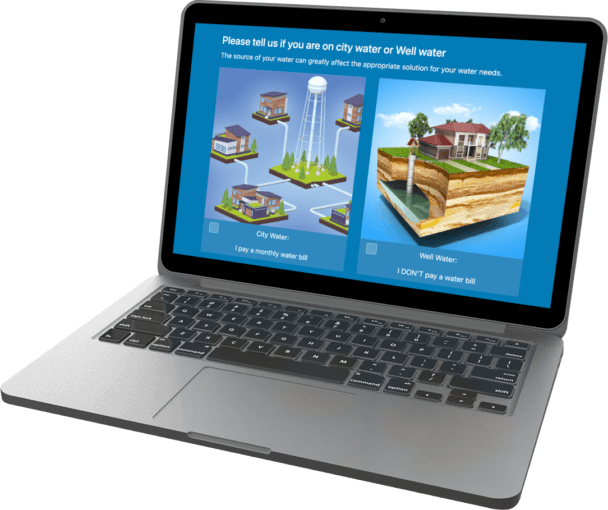Struggling with hard water in Algonquin, IL? Angel Water understands the specific water challenges faced by residents here. Our high-quality water softening systems are designed to eliminate excess calcium and magnesium, providing soft, clean water for your home or business. With over 50 years of experience in the water treatment industry, we are dedicated to enhancing your water quality and ensuring your complete satisfaction.
Water Softeners In Algonquin, IL
How Do I Choose the Right Water Softener and Get Started?
The process begins with a water test to identify contaminants. Understanding these issues helps us develop a solution. We then conduct a plumbing inspection to determine the best installation spot. Finally, we determine the type and size of the necessary equipment.
Thinking, “Can’t you just tell me over the phone? You installed my neighbor’s system!” We understand – we’re consumers too. However, your neighbor’s water or plumbing might differ slightly. Our goal is to ensure you have perfect water for drinking and bathing. We provide unbiased third-party water testing and employ licensed plumbers as required by Illinois law, prioritizing your family’s health and well-being.
Why Choose Angel Water?
Expertise:
Over 50 years of experience in resolving water quality issues.
Advanced Technology:
Our water softeners use the latest technology for efficient operation.
Customer Satisfaction:
Free water analysis and customized solutions tailored to your needs.
Highly Rated:
Over 1,000 5-star ratings on Google demonstrate our commitment to excellent service.
Licensed Plumbing Company:
The only water softening company in Illinois that is also a licensed plumbing company.
Lifetime Warranty:
The only company offering a lifetime warranty on our ERR-3700 series filters.
A+ BBB Rating:
An A+ rating with the Better Business Bureau shows our commitment to quality service.
Benefits of Water Softening
Prevent Scale Buildup:
Soft water helps prevent scale buildup in pipes and appliances, extending their lifespan.
Better Cleaning:
Enjoy cleaner dishes, softer laundry, and easier cleaning.
Improved Skin and Hair:
Soft water is gentle on skin and hair, reducing dryness and irritation.

Here’s What You Need to Know About Drinking Water in Algonquin, IL
The city of Algonquin, IL, supplies groundwater to over 33,000 residents. Alarmingly, data collected by the Environmental Working Group (EWG) indicate the drinking water in Algonquin contains several contaminants that exceed their health guidelines.
What does this mean for Algonquin homeowners, and how can they protect their health?
Read on to learn about these harmful pollutants and the water filtration options available in Algonquin.
| Contaminant | 2017 Total |
EWG Recommendation
|
| Bromodichloromethane | 12.2 PPB | 0.06 PPB |
| Bromoform | 0.632 PPB | 0.5 PPB |
| Chlorate | 459.4 PPB | 210 PPB |
| Chloroform | 22.1 PPB | 0.4 PPB |
| Dibromoacetic Acid | 1.92 PPB | 0.04 PPB |
| Dibromochloromethane | 6.15 PPB | 0.1 PPB |
| Dichloroacetic Acid | 9.52 PPB | 0.2 PPB |
| Haloacetic Acids | 21.8 PPB | 0.1 PPB |
| Nitrate and Nitrite | 0.793 PPM | 0.14 PPM |
| Radium-226 and -228 | 1.55 PCI/L | 0.05 PCI/L |
| Total Trihalomethanes | 41.1 PPB | 0.15 PPB |
| Trichloroacetic Acid | 10.4 PPB | 0.1 PPB |
Chlorate
Chlorate is an anion that often forms in water because of disinfectant use. It can also enter the water through contamination from pesticide overflow or papermill waste.
Consuming too much chlorate can lead to inflammation of the thyroid. It is especially harmful to children because it can cause problems with their nervous system or anemia. Chlorate can also cause problems during pregnancy and congenital disabilities.
A 2017 study by the EWG showed that the amount of chlorate in drinking water in Algonquin was 459.4 ppb. While there is no official legal limit for chlorate in water, this total was 2.2x higher than the EWG-recommended limit of 210 ppb.
Haloacetic Acids
The haloacetic acids are five acids that typically form when municipalities use common disinfectants to treat their water. All five of the acids come with serious health risks when consumed at too high a frequency. These risks include cancer, complications during pregnancy and harmful mutations.
While the government sets a standard limit of 60 ppb for total haloacetic acids in drinking water, the EWG thinks this limit is far too high. Instead, to best protect people from the acids’ harmful effects, the EWG sets a limit of 0.1 ppb. Unfortunately, the drinking water in Algonquin tested at 21.8 ppb, which is 218x higher than the recommended limit.
Here is a detailed breakdown for each of the five haloacetic acids:
- Dibromoacetic acid – 1.92 ppb (48x higher than the EWG limit of 0.04 ppb)
- Dichloroacetic acid – 9.52 ppb (48x higher than the EWG limit of 0.2 ppb)
- Monobromoacetic acid – None detected
- Monochloroacetic acid – None detected
- Trichloroacetic acid – 10.4 ppb (104x higher than the EWG limit of 0.1 ppb
Nitrate and Nitrite
Nitrate and nitrite are essential nutrients for plants and animals. They are frequently used in fertilizers to help plants grow. However, runoff from these fertilizers can sometimes contaminate the groundwater.
High levels of nitrite and nitrate in drinking water can lead to many health issues, including low blood pressure, high heart rate, headaches and vomiting.
The EPA-endorsed limit for nitrate and nitrite is 10 ppm. However, the EWG sets their recommendation far lower at 0.14 ppm. In 2017, Algonquin tested at 0.793 ppm, or 5.7x higher than the EWG guideline.
Radium-226 and -228
Radium-226 and -228 are both naturally occurring radioactive isotopes. However, human activities, like gas and oil extraction, can also cause radium contamination.
Health problems associated with radium-226 and -228 consumption include cancer, kidney disease and congenital disabilities.
Algonquin’s water tested at 1.55 pCi/L in 2017. And while that total is under the legal limit for radium of 5 pCi/L, the EWG considers it unsafe. Their limit is much stricter at 0.05 pCi/L.
Total Trihalomethanes (TTHMs)
The total trihalomethanes are a group of four harmful chemicals that frequently find their way into drinking water. Like the haloacetic acids, trihalomethanes also form as byproducts of the water disinfection process.
The main health hazard associated with these chemicals is cancer. However, some studies have also shown it to cause various problems during pregnancy, such as heart issues and neural tube damage.
The EPA sets the legal limit on TTHMs at 80 ppb. But once again, the EWG is much stricter, placing their limit at 0.15 ppb. Sadly, the drinking water in Algonquin recently tested at 41.1 ppb, or 274x the EWG limit.
Here is a breakdown for all four of the TTHMs:
- Bromodichloromethane – 12.2 ppb (204x higher than the EWG limit of 0.06 ppb)
- Bromoform – 0.632 ppb (1.26x higher than the EWG limit of 0.5 ppb)
- Chloroform – 22.1 ppb (55x higher than the EWG limit of 0.4 ppb)
- Dibromochloromethane – 6.15 ppb (61x higher than the EWG limit of 0.1 ppb)
We’re Here to Help!
We hope this post has helped you understand the water problems currently affecting local families. Moreover, we want you to know that you don’t have to settle for unhealthy water! Instead, you have the power to get your water tested and invest in the solutions that will protect your family’s health!
At Angel Water, we have been empowering our neighbors to do this for over 50 years! Our licensed professionals would be happy to test your water for you and help you find the right water softener or reverse osmosis system for your situation. We also offer installation and maintenance services to keep your systems running well.
Please call us today at (847) 382-7800
or fill out the form below to talk with an expert or schedule a free consultation!
How do I know what system is right for my family?
Get A Free Water Test!
Just fill out the form below and we will reach out to schedule the best time for your free water test!
Would You Like to Know More About Your Local Water Quality?
If you want to understand the quality of the water your family depends on everyday, contact us today. One of our representatives is standing by to help you schedule your free water test. We’ll send one of our local water expert to test the water at your tap and explain common problems and solutions for your specific water composition so that you can rest easy, knowing that your family is drinking the healthiest water possible.
